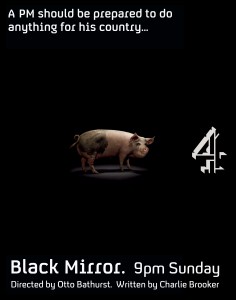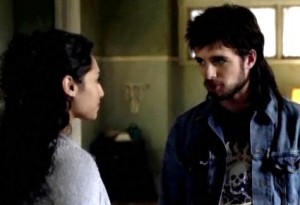As I mentioned in class today, I was floored by Our War on Monday. This was for several reasons, including subject matter, aesthetics, and personal interests. First and foremost, war always has been and always will be a touchy subject for anybody involved. It is an awful thing that leads to children without fathers, sisters without brothers, and leaves wives as widows. The fact that such a controversial topic, especially while the war is ongoing, is something I don’t think you see too much of on American television. While, yes, History Channel and Military Channel have hours upon hours of war footage, very little of it is up-close and personal. It’s usually wars from decades ago or is similar to how CNN originally covered the first Gulf War–from a distance, often with night-vision cameras–or even worse, it’s docu-drama war. Obviously this wasn’t the case with Our War. The biggest shock with subject matter, to me, however, was the disagreement between the Ministry of Defense and Lieutenant Bjorn Rose. As soon as I learned of the conflicting chain of events, the first thing that came to my mind was the story of Pat Tillman a couple of years ago. (Cliff’s Notes version: NFL player retires, joins the Rangers after 9/11, is killed in action in Afghanistan, months later find out that it was friendly fire that killed him). This was one of the major black eyes that hit the United States military and kind of solidified the public completely turning on the war effort. That’s why it is amazing that the BBC would show something so controversial that could have adverse effects on the national moral and opinion, WHILE THE WAR IS ONGOING.
Obviously, part of the reason war is such a touchy subject matter is because of the images that come with it. The fact that a majority of this documentary was real, handheld footage from the front lines allows viewers to connect with the soldiers in ways that are usually impossible. Docu-drama allows a certain level of connection, but the intimacy one gets from the unedited, raw footage from the soldiers actually fighting this war is unlike anything I, and most of us I’m sure, have seen on television. The unadulterated emotion from these men, whose lives are on the line, is phenomenal and some of the most gripping television I have ever seen. The frequency of “fuck” in the dialogue puts you in the situation and makes you realize the gravity of the situation that one of them has been hit, and hit critically. The shots of the platoon struggling to evacuate Private Gray on their hammocks just eats away at your core. You want them so badly to get him to the medical evacuation in time to save his life. These are connections with characters that aren’t made in typical television programs or in other war docu-dramas.
In addition to the footage from the soldiers, the camera work during the interviews of these soldiers and the family of Private Gray jar the audience in a different way. Through the use of extreme closeups, we are able to see the pain that Chris Gray’s mother feels when she thinks of him, the pride his father feels that knowing his son died for a cause, the guilt Lieutenant Rose feels that one of his men was brought home in a box rather than in a seat.
While any of us could talk of the subject matter or aesthetics (and many of us did today), the next aspect is more personal and something not many people here at Notre Dame know about me. I don’t want to give off the wrong idea, I have not had a family member die in combat, so forgive the set up for this.
I come from a military family. My grandfather, two of my uncles, my biological father, and my dad all have served/serve in the military. My grandfather served in Vietnam; my uncles have combined for 8 tours in Iraq. But the worst for me was when it was announced my dad would miss the majority of my senior year in high school to serve our country in Iraq. From October until July, my dad was just like some of the soldiers you saw in Our War…and I lived in constant fear that he would be sent home in a box draped by the American flag. Having my dad miss my senior year of football and graduation was bad enough, but the fear that any day could be his last was almost unbearable. I’ve never seen footage of what he did in Iraq, so it’s very easy to place him into the handheld action of Our War. Needless to say, this made the viewing of the documentary very difficult, but very moving for me at the same time.
I know the last paragraph doesn’t necessarily speak to the quality of Our War, but it was something I felt I needed to add. Overall though, I think Our War should be mandatory viewing for any idiots who don’t support our troops serving at home or abroad.





